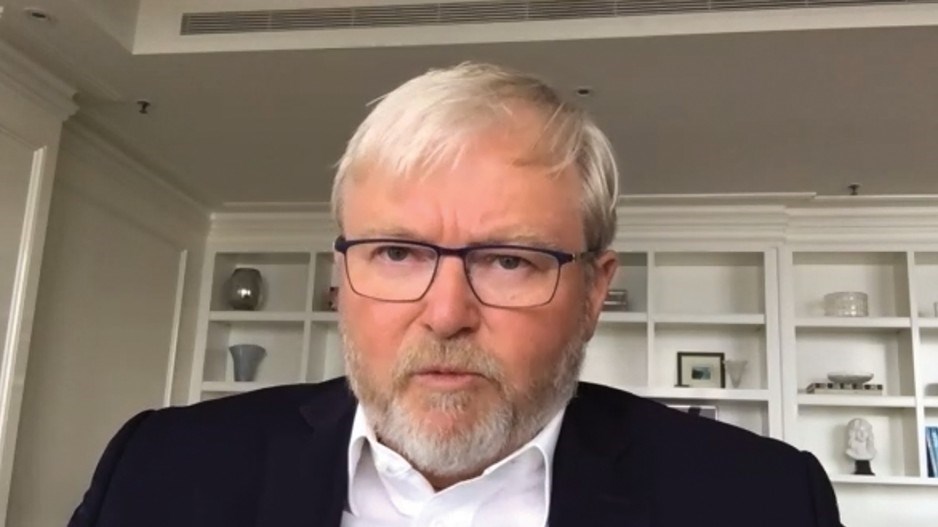Canada has done what it should in its relations with China, and Beijing should reconsider its recent hardline “wolf warrior diplomacy” stance against the West if globalization is its goal.
That’s the assessment of several high-level former government officials, researchers and analysts from Australia, Europe and the United States presented in a series of Canadian virtual forums held in the past week discussing Canada’s current relationship with China, its second-largest trade partner.
Chief among those voices was former Australian prime minister Kevin Rudd, who blamed Beijing for Canada’s current strained relationship with China. Rudd, fluent in Mandarin, was a key catalyst of Australia’s free-trade deal with China, which was finalized in 2014, after Rudd left his post. He was the keynote speaker October 13 at Canada China Business Council’s (CCBC) 42nd annual general meeting and business forum.
“… it always take two to tango in a diplomatic, political and economic relationship, as it is like in business,” Rudd said when asked by the moderator – former Canadian foreign affairs minister John Baird – about advice for Canada. “Often, the script in Beijing is, ‘If only those pesky barbarians [westerners] would agree to our world view, then everything would be fine, and we could dance the tango happily – however, with China in the lead.’ And guess what? If you are a liberal democratic system ... that’s always going to be deeply problematic.
“I think what I would say to our Chinese friends is, it is not an accident that countries as diverse as Australia, Sweden, France, Germany, Canada and Japan are now exchanging notes very closely on how to deal with China’s strategic challenge. And it’s because China, in some respects in the last several years, has gone too hard and too far.”
Rudd added that the arrest of Canadians Michael Kovrig and Michael Spavor two years ago illustrates the damage China’s recent moves have done to the geopolitical trust and stability needed to foster growth in global trade and investment, especially for western companies in the Chinese market.
The arrest of the two Canadians is widely seen as Beijing’s retaliation for Canada’s arrest of Huawei Technologies Co. Ltd. CFO Meng Wanzhou in Vancouver in December 2018 on a U.S. extradition request.
“So I say to our friends in Beijing who are from a more traditional form of diplomacy in this tango … that it’s time for China to reflect on having gone too far,” Rudd said. “In Canada’s case, an important gesture ... would be to take action on the two Michaels.
“The two Michaels are not just Canadians. They are seen [outside China] as ‘one of us,’ as in any foreigner currently working in Beijing or China, of which there are hundreds of thousands. If the individual citizens and businessmen feel vulnerable … the probability of continuing to conduct business as usual will diminish over time.”
Rudd’s message at the CCBC event was echoed by other analysts at the Asia Pacific Foundation of Canada’s October 21 “China in Asia: Implications for Canada” webinar.
Vikram Singh, senior adviser to the Asia Program at the U.S. Institute of Peace, said he has known Kovrig for almost 20 years and that the detained Canadian would “never violate any Chinese law” and has always been “totally transparent” during his career in China. Singh added that the detention of the two Michaels is “chilling” when considered along with recent U.S. media reports that Beijing has warned American officials it will detain American citizens if Washington continues to prosecute Chinese scholars arrested in the United States for alleged espionage.
“It’s a tragedy, and it’s also a symbol of China’s willingness to use what you might call ‘horizontal escalation’ as it is in competition or has concerns with other nations. China may choose to target students or business professionals, and I think that’s part of the shadow that has come over China’s relationship with not just the United States, but also with other partners.”
Singh added that the West’s growing unease over China’s global intentions is increasing in western antagonism against Beijing, which the Chinese leadership in turn sees as attempts to thwart its global game plan.
In this environment of distrust and multiple conflicting interests, Singh said Canada needs a plan that defines which lines Ottawa will not cross in dealing with the world’s second-largest economy and a key growth driver in global supply chains. •




